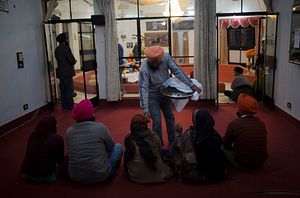The conflict from 1984 to 1995 had devastating consequences for the villages and towns of Punjab. Even today, locals are as likely as not to introduce themselves with a photo or faded press clipping that relates to a loved one lost to alleged or proven cases of enforced disappearance, extrajudicial killing, or clandestine cremation. Civil society leaders across the state have been working for justice and the social and economic conditions that might enable a sustainable peace. Their public leadership – either as individuals or through the informal networks they have formed – is both a salve and a source of inspiration and solace for survivors.
The Armed Conflict Resolution and People’s Rights Project is housed at the University of California at Berkeley, within the Center for Nonprofit and Public Leadership at the Haas School of Business. This Project concentrates on internal armed conflict and mass social violence, together with issues of prevention, and reparatory and transformative justice. The Project seeks to understand the cultural and legal contexts that lead to such violence, the long-term consequences for its victims, and how they address its effects. Despite the intrinsic political nature of such conflict, the Project does not take a political stance, nor does it attempt to identify political solutions. The Project is currently focused on South Asia, specifically India. Over time, it plans to apply the lessons from India in other countries.
Active cooperation among community leaders and institutions, nonprofits, academics, and policymakers is crucial to conflict transitions and to developing inclusive and equitable parameters for economic, psychosocial, and policy changes. Drawing on in-house capacity at the Center and elsewhere at Berkeley, and among partnering institutions, the Project’s overarching goal is to establish a collaborative and multilateral network of scholars, academic and advocacy institutions, and local civil society partners and victims-survivors, to produce a policy framework and technical protocols or blueprints for accountability.
If a policy and protocol framework were adopted to protect people’s rights consistent with India’s legal and constitutional commitments, it would contribute to justice and stability across India, the world’s largest democracy, and perhaps serve as a model for other countries.
The first protocol is focusing on gendered and sexualized violence. Learning from local civil society leaders from various walks of life, the Project is creating a prototype for the right to remedy, focusing on psychosocial and legal restitution, economic development, and historical dialogue.
Armed Conflict Resolution and People’s Rights Project, University of California at Berkeley’s Center for Nonprofit and Public Leadership-Haas School of Business. Text by Project Co-chairs Angana Chatterji and Shashi Buluswar and Director of Programs Mallika Kaur. Images by Robert Nickelsberg, except where noted.











































